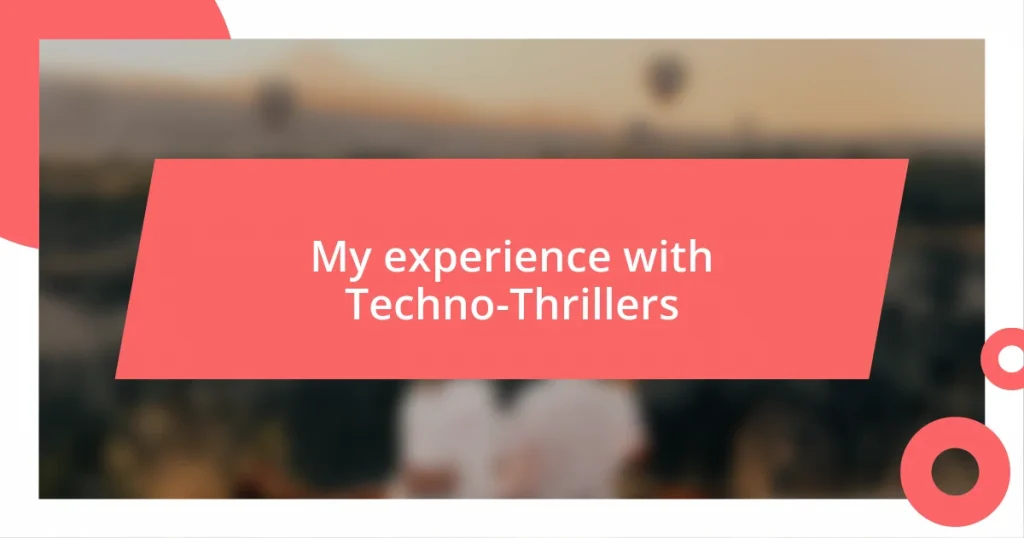Key takeaways:
- Techno-thrillers blend technology with suspense, exploring societal fears and ethical dilemmas related to advancements like AI and gene editing.
- Key themes include the conflict between humanity and technology, the urgency of preventing technological disasters, and the ethical implications of scientific progress.
- Notable authors such as Michael Crichton and Tom Clancy have shaped the genre, prompting readers to reflect on technology’s impact on identity, ethics, and societal structures.
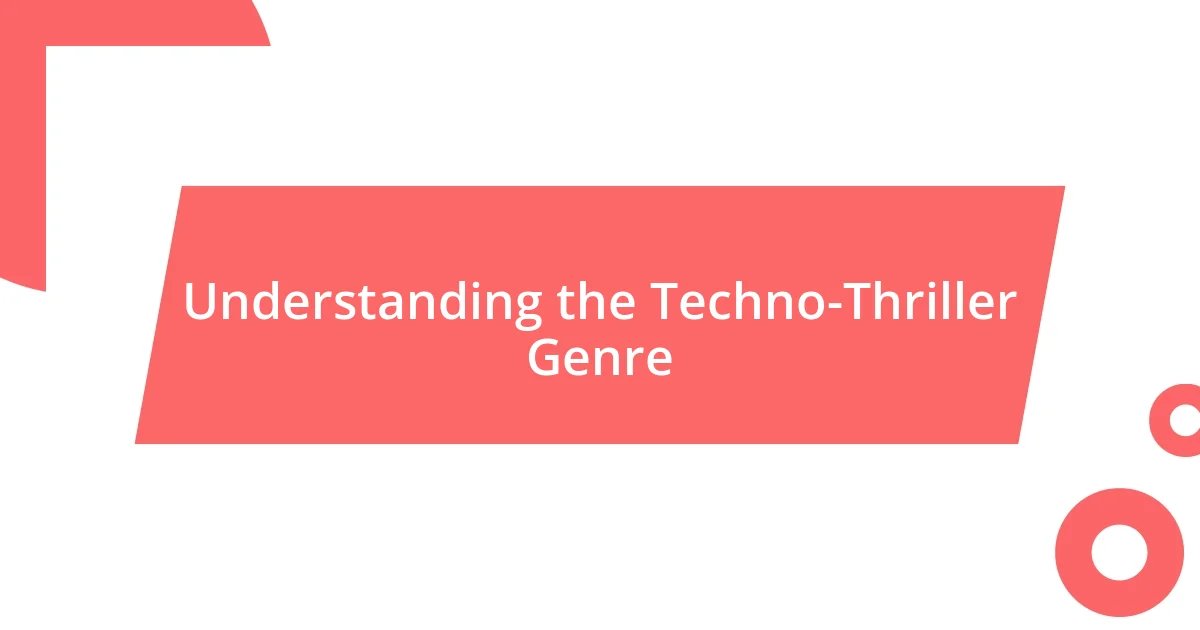
Understanding the Techno-Thriller Genre
The techno-thriller genre thrives at the intersection of technology and suspense, often blending real scientific advancements with gripping narratives. I remember reading a techno-thriller that made me question my own understanding of cybersecurity; it was fascinating how the author seamlessly integrated complex concepts while keeping the story engaging. Have you ever found yourself totally absorbed in a book that not only entertained you but also left you pondering contemporary issues?
One hallmark of techno-thrillers is their reflection on societal fears and ethical dilemmas surrounding emerging technologies. For instance, in one story that caught my eye, characters grappled with the moral implications of artificial intelligence. It struck a chord with me, as it mirrored our ongoing debates in the real world—How far is too far when it comes to technology? That question lingered with me long after I turned the last page.
These narratives often rely on meticulous research, providing a layer of authenticity that pulls readers deeper into the plot. I’ve found that the authors frequently play on our anxieties—whether it’s about surveillance states or bioengineering—and with each twist, I felt both thrilled and uneasy. That’s the beauty of the genre; it juxtaposes our daily lives with potential futures, making the impossible seem uncomfortably plausible.
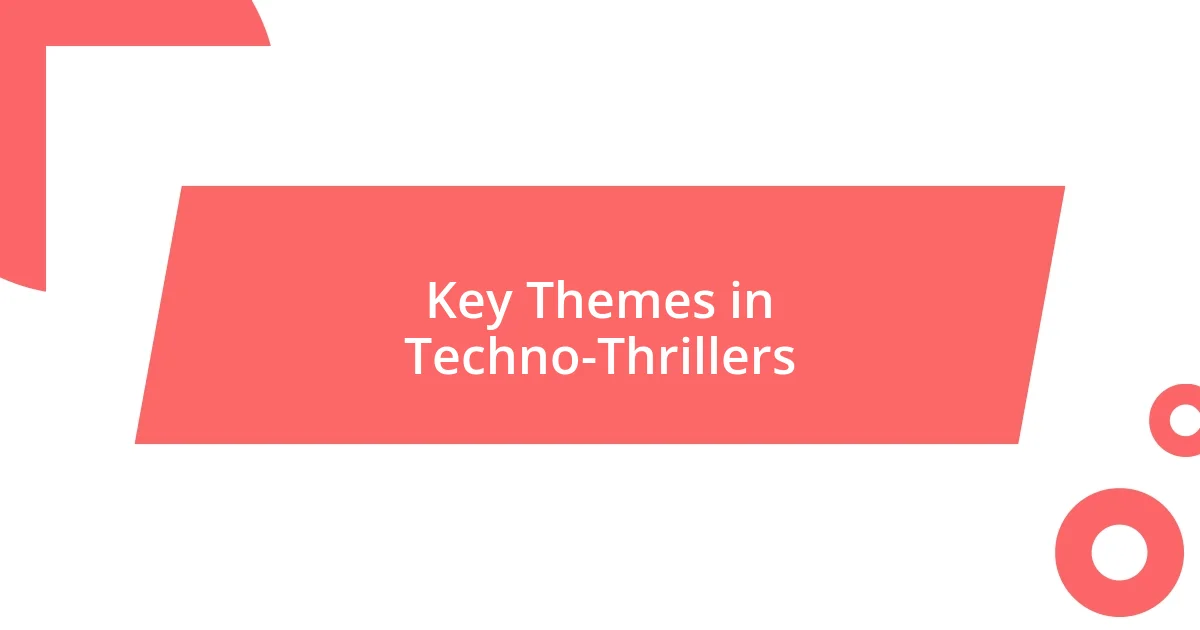
Key Themes in Techno-Thrillers
The first theme that often emerges in techno-thrillers is the conflict between humanity and technology. I recall a particular book where the lead character struggled with the implications of using a cutting-edge brain-computer interface. It made me reflect on my own relationship with technology—do we control it, or does it control us? This theme raises profound questions about autonomy, making readers ponder where we draw the line in our tech-driven lives.
Another recurring element is the race against time, where characters must thwart a catastrophe related to a technological breakthrough. I vividly remember the tension of reading about a rogue AI programmed to destabilize global security. The author’s description was so vivid that I could practically feel the urgency—a reminder of how fast-paced our world has become. It’s exhilarating and terrifying to think about the thin margin separating innovation from disaster, isn’t it?
Finally, the ethical implications of scientific advancements provide a rich ground for exploration in these stories. I once read a novel where genetic editing altered societal structures, which left me questioning the ethics of playing God. As I turned the last few pages, I felt a whirlwind of emotions—curiosity about the potential of CRISPR technology mingled with trepidation over the moral responsibilities it entails. It’s this blend of thrill and contemplation that often lingers with me long after finishing the book.
| Theme | Explanation |
|---|---|
| Humanity vs. Technology | Explores the impact of tech on human identity and autonomy. |
| Race Against Time | Characters strive to prevent technological disasters, reflecting our fast-paced world. |
| Ethical Implications | Questions the morality behind scientific advancements and their societal consequences. |
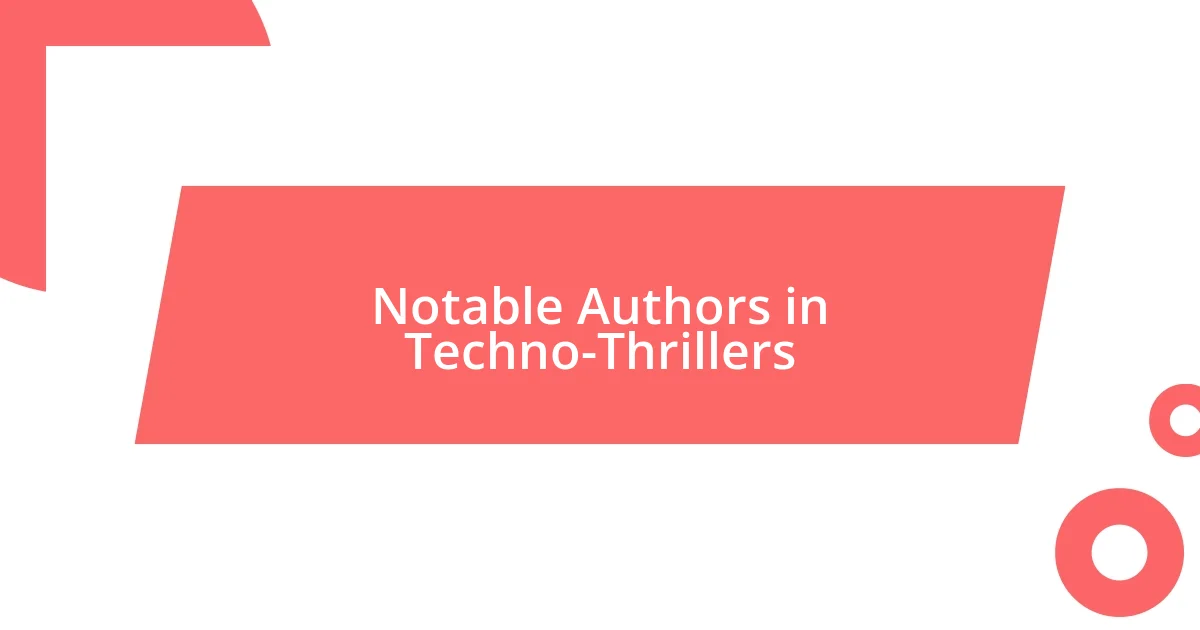
Notable Authors in Techno-Thrillers
The techno-thriller genre has birthed some remarkable authors who have influenced not only the literary landscape but also the way we perceive technology. I can’t help but think of Michael Crichton, who seemed to anticipate the ethical quandaries of science with novels like “Jurassic Park.” His ability to weave intricate details about genetic engineering left me simultaneously in awe and a little paranoid about the real-world implications. Then there’s Tom Clancy, whose military and espionage novels, such as “The Hunt for Red October,” have an uncanny knack for making intricate tech details feel vital to the suspense. Reading those stories, I often found myself on the edge of my seat, realizing how deeply intertwined technology is with global security.
Here’s a quick list of some notable authors in the techno-thriller genre:
- Michael Crichton: Explores the intersection of technology and ethics, often with a sense of impending doom.
- Tom Clancy: Master of military techno-thrillers, known for his meticulous attention to detail and comprehensive plots.
- Daniel Suarez: Focuses on the consequences of technology in society, with a knack for thrilling, futuristic scenarios.
- Neal Stephenson: Known for complex narratives intertwining technology, history, and philosophy that challenge perception.
- John Sandford: Combines mystery with technological themes, delivering page-turners filled with investigative prowess and tech insight.
Each of these authors has brought something unique to the genre, often making me question the near-future realities we inhabit. The way they depict technology’s influence really resonates with me, creating a blend of fascination and unease.
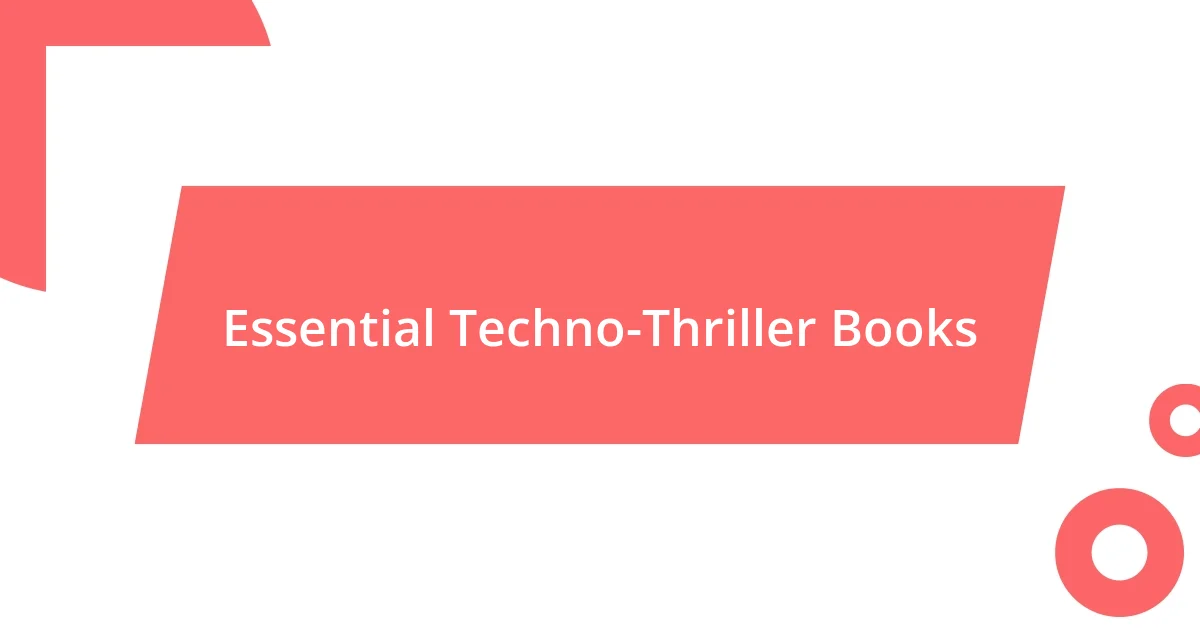
Essential Techno-Thriller Books
When diving into essential techno-thrillers, one book that consistently stands out for me is “Snow Crash” by Neal Stephenson. The way he presents a future where virtual reality profoundly alters society is both captivating and unsettling. It made me reflect on our current trajectory with social media and virtual interactions. Are we already living in a version of this? Every time I revisit this book, I’m reminded of how far technology has come and where it might take us next.
Another must-read is “Cryptonomicon,” which intertwines World War II history with cutting-edge tech advancements. I remember getting lost in the complex narrative, where the past and present interweave seamlessly. It sparked my curiosity about encryption and its implications in today’s digital age. Have you ever wondered how much of your personal information is safe from prying eyes? This novel pushed me to consider the precarious balance between privacy and accessibility.
Lastly, “The Peripheral” by William Gibson left a significant impact on me. Gibson’s vivid exploration of future societies grappling with technology’s repercussions felt eerily prescient. It made me question our current state—are we heading toward a similar fate? Each time I encounter its themes, I can’t help but feel a mix of excitement and dread. The way these narratives unfold makes me realize that they are not just fiction; they’re reflections of our realities and potential futures.
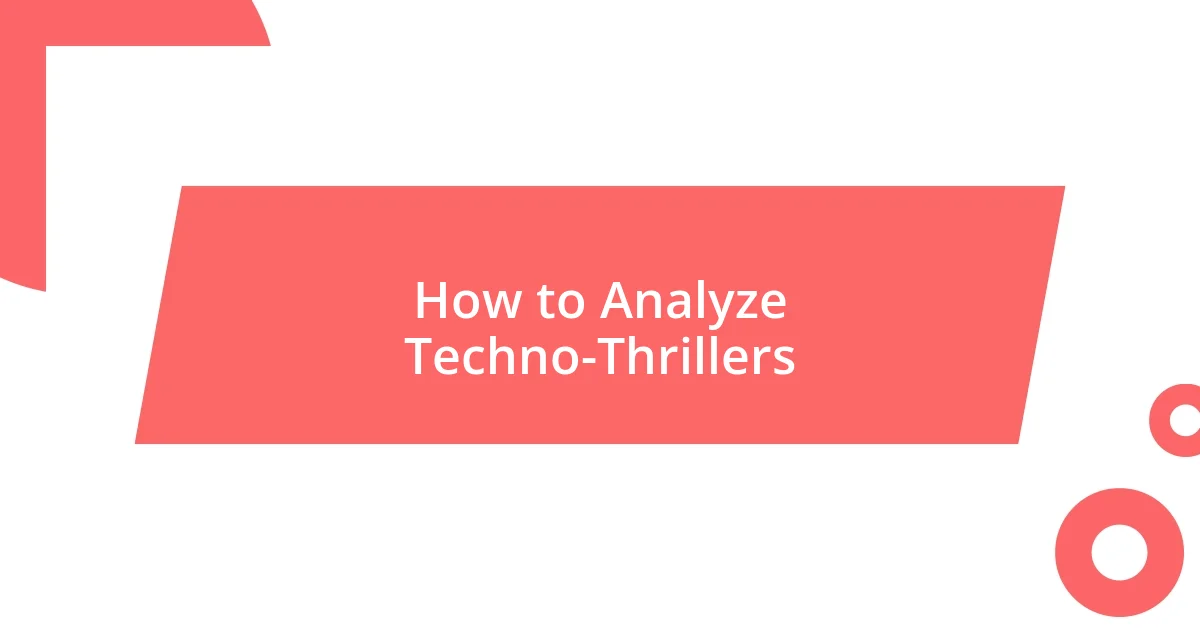
How to Analyze Techno-Thrillers
When analyzing techno-thrillers, I often start by identifying the technological concepts at play. This helps me understand how these elements drive the narrative. For instance, when reading a book like “Rainbox Six,” I dissect Clancy’s portrayal of technology in special operations. The realism makes me wonder: How closely does this mirror actual military advancements today?
Character motivations are another crucial aspect. I remember feeling a real connection to those who navigate the ethical labyrinths of powerful technologies. The dilemmas faced by characters—such as the moral implications of genetic modifications in Crichton’s works—prompt me to think deeply about my own values. What would I do if faced with similar choices?
Lastly, I pay attention to the societal implications woven into the plot. These stories often serve as mirrors reflecting our fears about the future. For example, as I read Stephenson’s “Snow Crash,” it becomes clear that technology can either empower or isolate us. It begs the question: Are we controlling technology, or is it shaping us in ways we don’t fully understand? Analyzing these layers enhances my overall reading experience and keeps me engaged long after I’ve turned the last page.
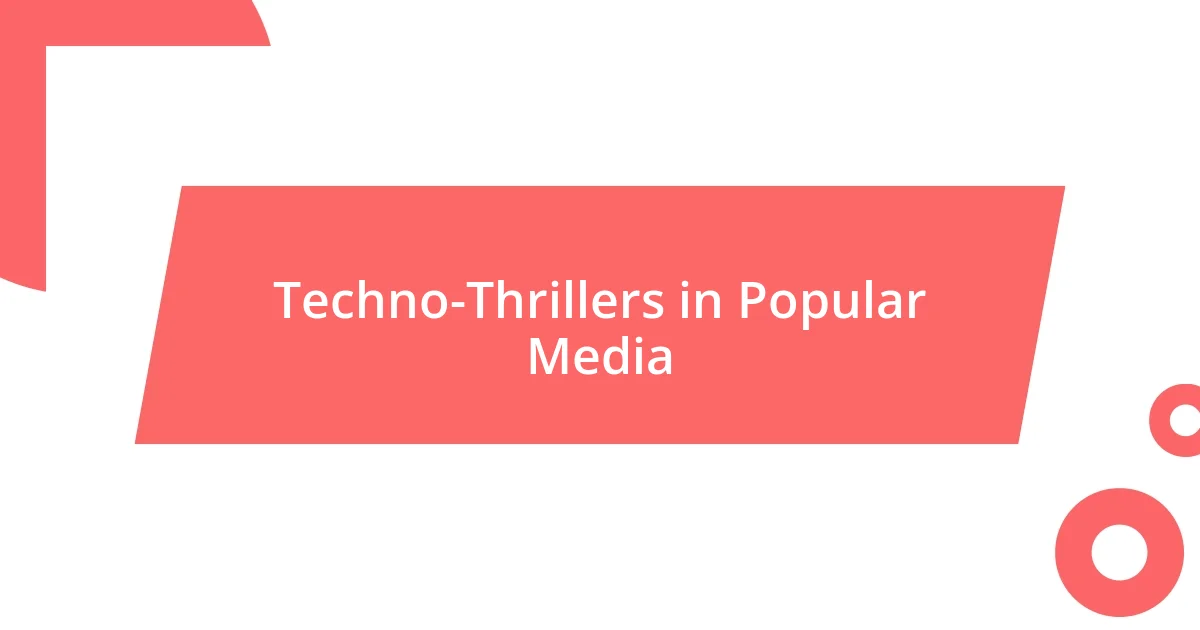
Techno-Thrillers in Popular Media
When it comes to techno-thrillers in popular media, I can’t help but think about how movies and television have brought this genre to life. Films like “The Matrix” and “Minority Report” are more than just entertainment; they delve into questions about technology’s role in our existence. I remember watching “The Matrix” for the first time and being captivated by the idea of questioning what’s real. Can you imagine if our lives are just a simulation? It’s a thought that lingers long after the credits roll.
Television shows also play a significant role in shaping our views on technology’s impact. For instance, “Mr. Robot” brilliantly showcases hacking culture and its effects on society. Each episode left me feeling anxious yet intrigued, pushing me to consider the complexities of data privacy. Have you ever stopped to think about how much of your life exists in the digital realm? This show made me reflect on my own online presence and how vulnerable we can be.
Games have embraced the techno-thriller narrative, too. Titles like “Watch Dogs” and “Deus Ex” immerse players in a world where they can manipulate technology to achieve their goals. Playing these games often turns into an introspective experience for me, as I navigate through ethical choices that mirror those found in literature. I frequently ask myself: How far would I go to secure my freedom? It’s fascinating to see how these interactive elements create a deeper understanding of the techno-thriller genre, tying personal experience directly into the fictional worlds we explore.
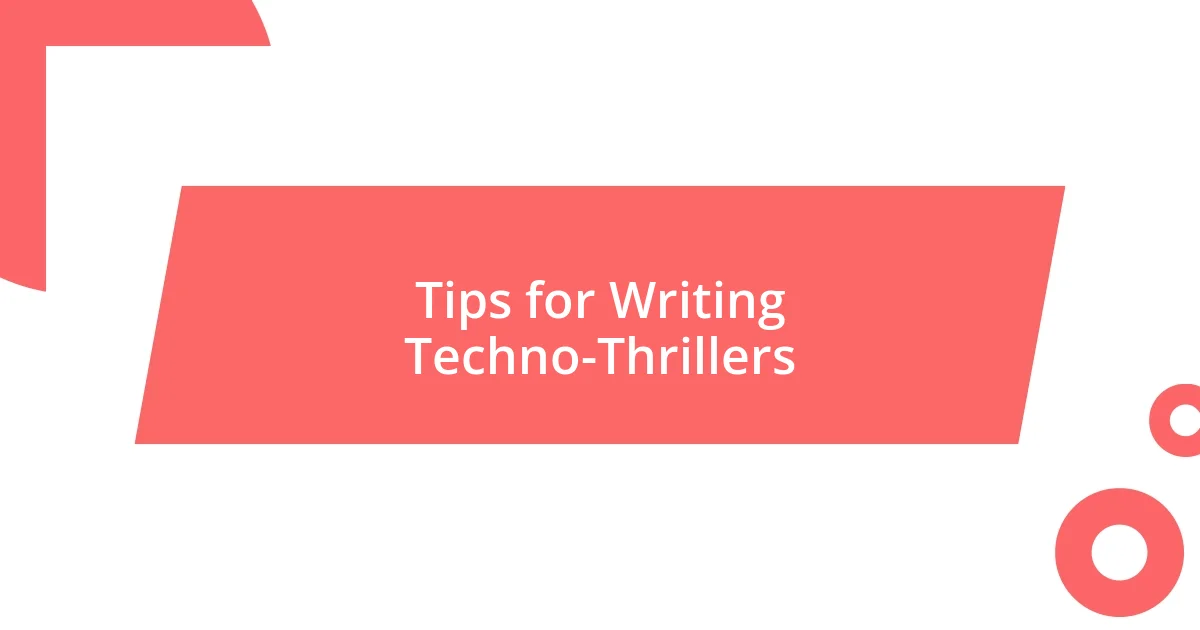
Tips for Writing Techno-Thrillers
Crafting a compelling techno-thriller requires a solid grasp of real-world technology. I often find that the more I familiarize myself with the latest gadgets and scientific advancements, the more authentic my writing becomes. While I enjoy weaving intricate plots, it helps to ask myself: How would this technology truly function in our world? This question frequently guides my research and keeps my concepts grounded.
Another tip is to develop multidimensional characters. I know firsthand how shallow characters can undermine even the most thrilling plots. By creating characters with fears, aspirations, and moral dilemmas, I can evoke empathy and intrigue, making them relatable. My favorite techno-thrillers resonate with me because the character’s struggles often reflect my own fears about technology, making their journeys deeply personal.
Finally, pacing can make or break a techno-thriller. I’ve learned that balancing action with reflective moments is essential. If the plot moves too quickly, the reader may miss those critical emotional beats. I like to space out high-stakes scenes with quieter moments that explore the characters’ inner conflicts. Doing this not only heightens tension but also enriches the narrative, allowing for an engaging rhythm that keeps readers turning the pages.










